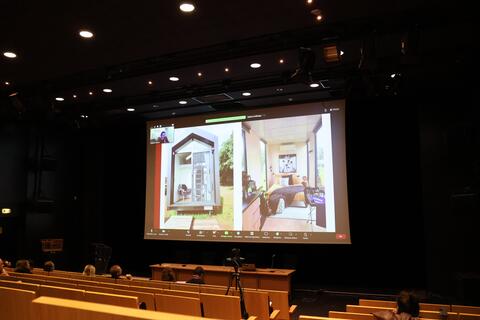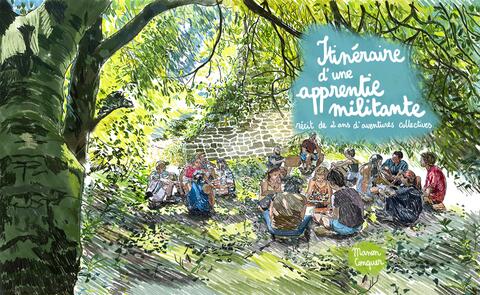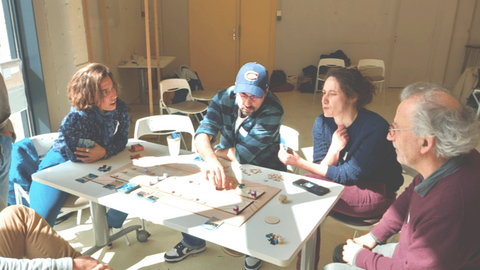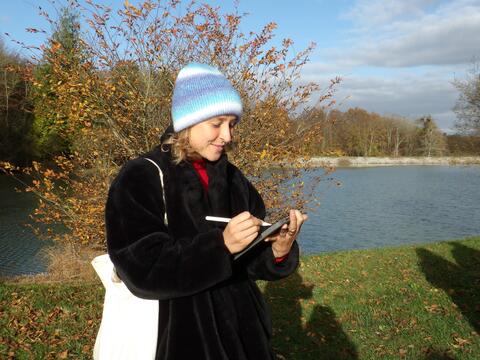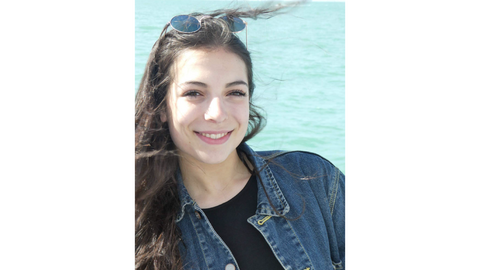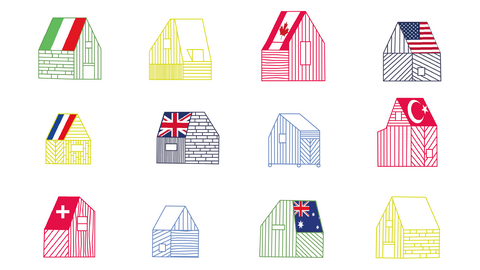The In Situ Master’s degree, offered as part of the France–Northern Europe program, looks to the adaptation capacities and high-level innovation in the Nordic and Baltic countries to prepare decision-makers and employees capable of handling short-term problems and long-term planning for new models.

- Objectives
- Overview
- Curriculum
- The In Situ France-Northern Europe Program
- Skills acquired
- Career opportunities
- Admissions
The In Situ Master’s degree, offered as part of the France–Northern Europe program, looks to the adaptation capacities and high-level innovation in the Nordic and Baltic countries to prepare decision-makers and employees capable of handling short-term problems and long-term planning for new models.
Instructors from the French Caisse des dépôts and urban planning agencies address audacity in the financing and management of regional and urban projects in a time of transition; designing the smart and connected cities of tomorrow (with new mobility plans, energy planning, urban landscaping and agriculture; the fundamentals of attractivity, lobbying and network-based governance, as well as new decision-making tools such as geographic information systems (GIS), digital programming and engineering.
Real-world, international teaching promotes a regional approach, with conferences by guest professors from Nordic countries. An apprenticeship in a local or national public entity, design/planning agency or company in France is completed in the fifth year of study.
- Included in the France–Northern Europe program
- Taught at the Caen campus
- Participation of reputed academics and professionals: Jean-Pierre Charbonneau (urban architect and former advisor to the cities of Lyon, Saint-Étienne and Copenhagen), Vibeke Knoop Rachline (Norwegian journalist and correspondent for Aftenposten in Paris), Marius Grønning (urban planning professor at the Norwegian University of Life Sciences in Ås/Oslo), Patrice Duny (Director of the urban planning agency of Caen Normandie Métropole), Imants Viesturs Lieģis (former Defense minister of Latvia and Latvia’s Ambassador to France), Viesturs Celmiņš (a research professor at Cambridge University and the University of Latvia), Nicolas Joyau (Deputy Mayor for the environment, sustainable development and energy for the city of Caen), Leonarda Ķestere (advisor to the Latvian minister of culture) and others.
In fourth year, students attend a seminar course on the future of urban planning (three introductory classes on urban planning and design, plus workshops, sessions on special topics, urban planning workshops, field trips); a series of conferences on Nordic cities hosted in partnership with the University of Caen; a conference on methods (introduction to GIS and R-CRAN); an intercultural workshop on sustainable development and beginner Swedish as a second language classes.
In fifth year, students complete an apprenticeship (with a contract) during which they spend three weeks of every month at a company and one week in class. The curriculum is divided into nine courses :
FIRST SEMESTER (30 ECTS credits)
- UE 1 - Pursuing a career in an international environment
Working in Northern Europe / Working with Northern European countries / Preparing for a student exchange in a Nordic city, Projects and different cultures: considerations, Public speaking / Theatre writing skills / Writing workshop, A French-Nordic forum on innovative initiatives.
- UE 2 - Designing strategies for regions in transition
Developing and leading regions, Major regional challenges in transitions (urban/rural), Urban planning and transitions, A strategic approach to design, Strategic planning for major cities in France and Northern Europe (first guest lecturer), Workshop: Creativity in regions, Conference or workshop: Les Boréales Festival.
- UE 3 - Financing transition projects
Economic development, Financing regions, Conducting public-private partnerships, Financing regional projects and local development, Financing design projects.
- UE 4 - Skillful regional innovation and anticipating tomorrow
Governing the future and how to anticipate in political science, Creativity and innovation in urban spaces, Developing innovation-driven projects, Conducting innovation-driven projects, Regional and urban foresight, Anticipating future challenges in urban planning.
- UE 5 - Building tomorrow’s cities (Part 1)
Focus – Smart cities: Governance and smart cities,Introduction to home automation, Urban pacification: tools and challenges, Urban policies, Urban design, Future mobility planning, GIS for professional studies, Computer science for tomorrow’s cities, Hacking in social sciences, Digital transitions in cities.
SECOND SEMESTER (30 ECTS credits)
- UE 6 - Building tomorrow’s cities (Part 2)
Focus – Social development in urban areas: Opening a fab lab or becoming a lab manager, Grassroots projects in France and Northern Europe, Eco-neighborhoods and eco-villages, The future of living spaces, Introduction to collaborative urban planning.
Focus – Urban landscaping and agriculture: Advanced landscaping design. Landscape planning in cities. Governing urban/rural spaces.
Focus – Sustainable design and energy planning: climate change and tomorrow’s cities, Cities and public health, Energy innovation in Northern European cities, Master class with second guest lecturer.
- UE 7 - Urban areas in inter-regional strategies
Developing European projects, INTERREG and macro-regional funding, Lobbying, Business and innovation: Arctic studies, City networking, Bilateral meeting event.
- UE 8 - French-Nordic design studio for urban systems (Immersion)
A three-week French-Nordic design workshop in June with lecturers, elected officials, business leaders and regional stakeholders.
- UE 9 - Apprenticeship report
Preparation and presentation of the report
A new Northern Europe department opened at the Caen campus in September 2017. The inauguration was attended by His Excellency Imants Viesturs Liegis, former minister and Ambassador of Latvia to France. In addition to several conferences and events, including a partnership with the Les Boréales Festival and the Rencontres franco-nordiques, a reference library specialized in Nordic and Baltic countries (made possible through a donation from the Latvian embassy), and close cooperation with city and regional stakeholders such as the University of Caen, the French–Norwegian trade and cooperation office and the Normandie-Pays nordiques Association, the learning offer of the department on history, geography, geopolitics, political sciences and economics in Northern Europe is quite unique in France.
The In Situ program goes beyond pure academics; it explores innovative projects and regions in Northern Europe using a critical and concrete approach with the aim of expanding the international expertise, inventiveness and success of our students. Northern Europe is defined in a broad sense to include not only the Nordic and Baltic countries of Iceland, Norway, Sweden, Denmark, Finland, Estonia, Latvia, Lithuania and Poland, but also the Arctic pole, northern Germany and Benelux.
The two-year In Situ Master’s program includes:
- Comparative classes and workshops on French and Northern European practices
- Visits from professionals from Nordic countries as part of sustainable development and Rencontres franco-nordiques events
- A master class every semester by a lecturer from a Northern European university in French or English in their area of expertise
- Beginner Swedish as a third language course
- Intercultural studies with a focus on sustainable development.
- The ability to design and manage a sustainable neighborhood, city or metropolitan region in the long-term using strategic planning tools, regional innovation and foresight.
- The ability to anticipate and incorporate complexity in urban initiatives from multiple angles – transportation, housing, public spaces, urban landscaping – as well as systemic effects in relation to specific issues, space and time.
- The ability to mobilize a wealth of innovative and pioneering international initiatives in Baltic and Nordic countries to better grasp tomorrow’s challenges.
- The ability to promote foresight, on-the-ground action, the co-construction of knowledge and objective analysis via innovative teaching methods.
In Situ prepares high-level executives who can identify and understand the specificities of the regions they will design as trailblazers of singular solutions. Every region is unique and requires more than a cookie-cutter model. We ensure that our students are familiar with underlying trends in public policymaking at the local level, A creative, personally tailored and unique approach to urban planning gives our students a global vision that makes them stand out from the rest. They develop a consistent and methodological approach that allows them to express their personal universe in planning the future.
The In Situ Master’s curriculum was co-developed with a panel of professionals who provided input on the needs and expectations of the sector.
Graduates pursue a career equipped with three key advantages: an innovative and up-and-coming approach to urban design; a resolutely international outlook, and in-depth knowledge of Northern Europe.
Frequently sought-after careers fall into one of three categories defined by CNCP training nomenclature; urban and regional planning, studies in urban planning and design, space management and project implementation.
The In Situ Master’s program primarily prepares graduates for work in the following fields (ROME classification):
- Urban planner
- Urban study officer
- Mediation officer
- Regional planning officer
- Agenda 21 sustainable development project officer
- Local development/economic development officer
Our graduates join public entities such as ministries, public agencies, local authorities, associations, urban planning firms, public housing authorities and research laboratories; non-profits, including semi-public companies and other local public companies; private entities such as research and consulting firms and large-scale firms involved in urban projects and smart city initiatives.
We encourage creativity in students to ensure that they can contribute ideas and practices in urban planning in conjunction with NGOs, grassroots and cultural organizations, as well as public and artistic venues.
The program looks at urban strategy from multiple geographical angles, so students can pursue a career in European projects and affairs or international relations at metropolitan, city, greater city and municipal authorities.
Of particular interest are city networks, cooperative platforms, non-profits and think tanks that are building the European and international cities of tomorrow. In Situ graduates also have access to a career in lobbying or at European entities based in Brussels.
An in-depth practice of Swedish and English, combined with networks established abroad, create the opportunity for an international career in the fields of urban planning and design.
In Situ is a combined first-time and continuous learning program. The second year of study (M2) is an apprenticeship.
The following categories of students can apply to the program:
First-year Master’s students (M1):
- students enrolled at Sciences Po Rennes at the Rennes or Caen campus who have successfully completed their first three years of study.
- fourth-year students accepted at Sciences Po Rennes at the Rennes or Caen campus who have passed the entrance exam or as part of an agreement with an establishment offering preparatory classes (the list is available on the Sciences Po Rennes website).
Second-year Master’s students (M2):
- students enrolled at Sciences Po Rennes at the Rennes or Caen campus who have successfully completed 240 ECTS credits.
- students at one of the eight regional Sciences Po schools who join the Master’s-level program as a combined fifth year of study.
- students who hold a five-year post-secondary degree from another university, grande école or similar establishment. Admission is based on an application and an interview for qualified applicants.
- students at business and engineering schools that are partners of Sciences Po Rennes (Audencia business school in Nantes, for example), based on an application and interview.
- continuing education students who have the equivalent of a four-year post-secondary degree, hold a professional role with executive-level operational and hierarchical responsibilities, and have at least five years of relevant experience in the subjects covered in the program. Admission is based on an application and an interview for qualified applicants.
An academic committee composed of at least one Master’s-level program manager and another tenured professor at Sciences Po Rennes examines applications, including the applicant’s high school and final year results, cover letter and resume. Admission is confirmed after an interview during which the applicant explains their career goals in urban planning.
Second-year Master’s admission:
February 19, 2024 to April 29, 2024: Click here to register and download the application file.
+ The completed application file and supporting documents should be emailed as a single PDF to the address indicated on page 2 of the file.
If your application is accepted, you may be contacted for an interview with the academic program director(s).



